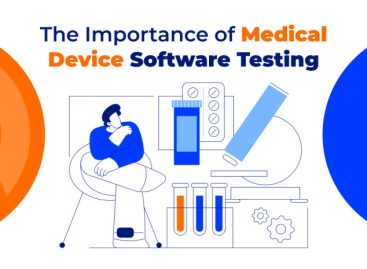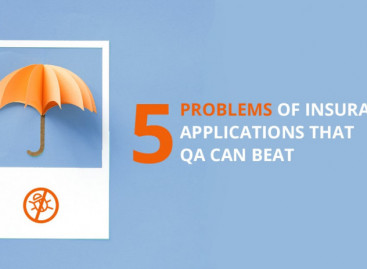- QATestLab Blog >
- QA for Business >
- Industries Insights >
- Checklist for Test Plan Review. Sample-Based
This article holds information for project managers and team leads who deal with test plans and face issues connected with the documentation.
To what extent the success of your project depends on the effective test plan? How to be sure that your testing provider presented the document that contains all the necessary information? 5-minute article to read and get the secrets from the company that knows all the aspects of test plan creation.
Why to doubt the test plan your QA provider offers you?
Leading a project presupposes dozens of processes to be managed and controlled. You need to allocate time and resources, establish effective communication with clients and team members, and not get lost in this mix.
Quality control of a product is also an important item in this list. Luckily there is an option to delegate this responsibility to the independent QA partner and carry on more urgent duties. Such kind of cooperation considerably simplifies the quality assurance process, though presupposes certain checkings. One of them is to verify that all appropriate activities have been included in the test plan. So, a good test plan should:
- satisfy all project requirements
- preserve sections that will allow you to control the testing process
- fully cover the functionality
- set the necessary time limits
- match with your expectations and with the service package offered by your testing provider
There is plenty of ready software testing plans on the Internet and you can use them as an example but who guarantees their credibility and effectiveness? The answer is obvious and it is one of the reasons our specialists share their experience on main constituents of the effective test plan.
Make sure the developed test plan meets the requirements of a project. Your Project
There are numerous elements to verify in the test plan: “I worked at the projects where clients cared most about the time allocated to testing, its environment, and detailed reporting.”– shares one of our QA specialists. “Clients should also control the organization of the testing process itself and we have to write a test plan that corresponds to their needs.”
We have gathered the main points that were mentioned by QATestLab testing engineers and organized them in a checklist format for better visualization.
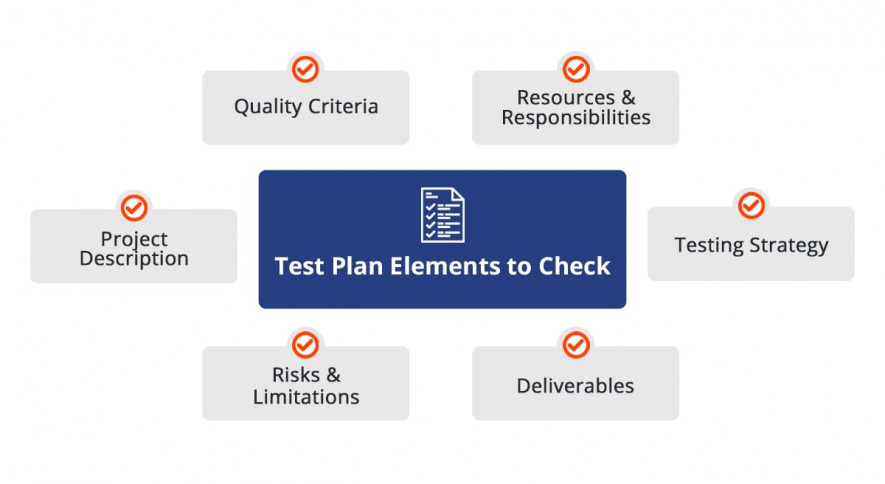
We do not add to this manual secondary sections that depend on the specifics of a definite project: introduction, decisive factors of the project success, testing phases, etc.
Let’s start with the tips on the description of a project. Project managers check it to make sure that the testing provider has clearly defined the scope of work, the components, and functions that need/don’t need to be tested. Below are the examples: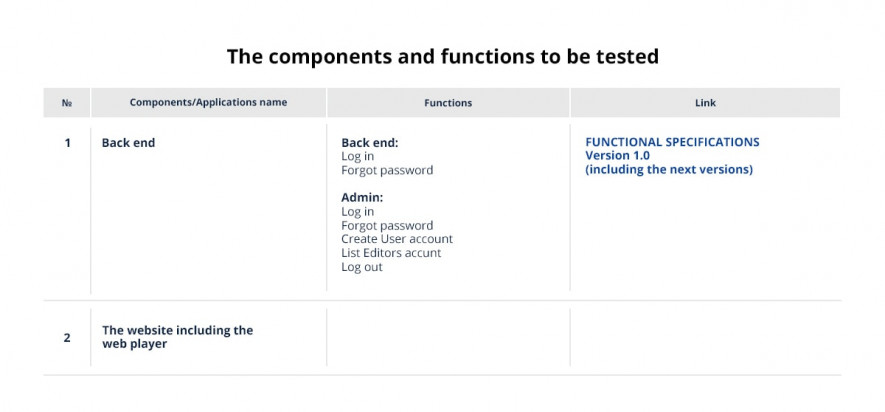
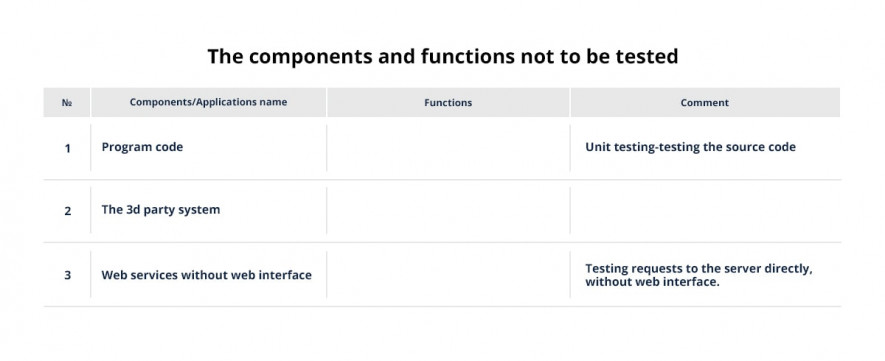 The next item to be verified in a test plan is the quality criteria which agree on the product functions and capacities listed in the specifications. This section also holds the number of acceptable errors in the testing process.
The next item to be verified in a test plan is the quality criteria which agree on the product functions and capacities listed in the specifications. This section also holds the number of acceptable errors in the testing process.
Risks and limitations should not only be discussed but double-checked during the test plan approval. Here the testing provider backs up and enumerates existing reasons to explain the possible faults. An example of such information looks like this:
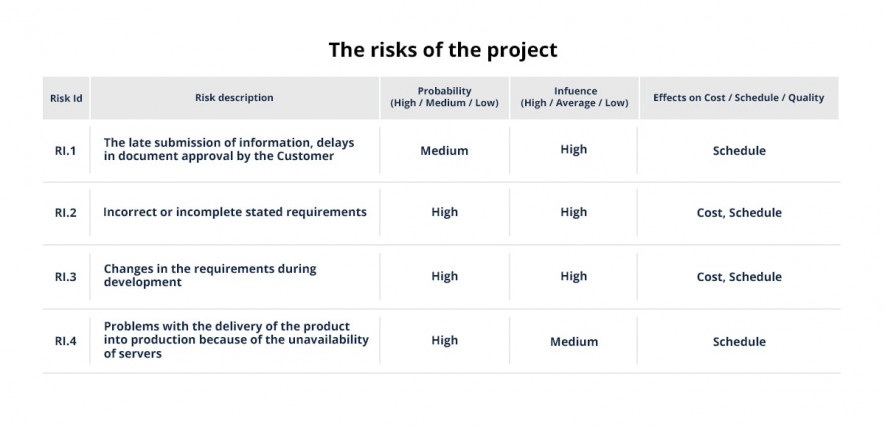 Various factors can be included in this list and should be negotiated beforehand. This section is often followed by the plan on how to reduce these risks.
Various factors can be included in this list and should be negotiated beforehand. This section is often followed by the plan on how to reduce these risks.
The next step is to check if the QA provider included the discussed amount of resources necessary to complete the task within the predefined deadline. This section also contains all contacts of the team members. If you want to find out the scope of work for each team member and understand their responsibilities, check this information in the corresponding section.
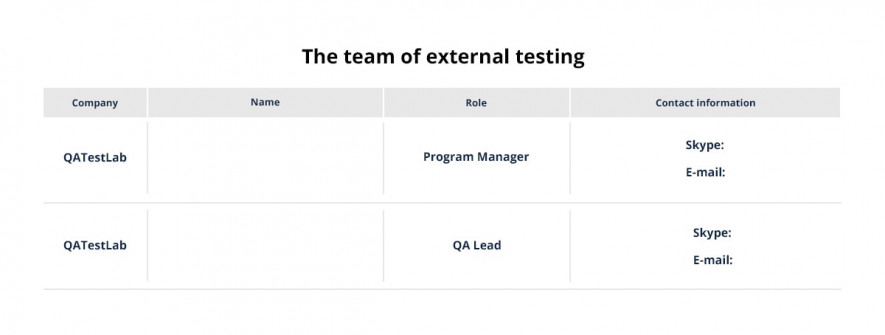 If you want to clearly understand the final outputs that will be received, don’t forget to control the completeness of the deliverables section. The testing provider here specifies the testing documentation and reports that will be delivered.
If you want to clearly understand the final outputs that will be received, don’t forget to control the completeness of the deliverables section. The testing provider here specifies the testing documentation and reports that will be delivered.
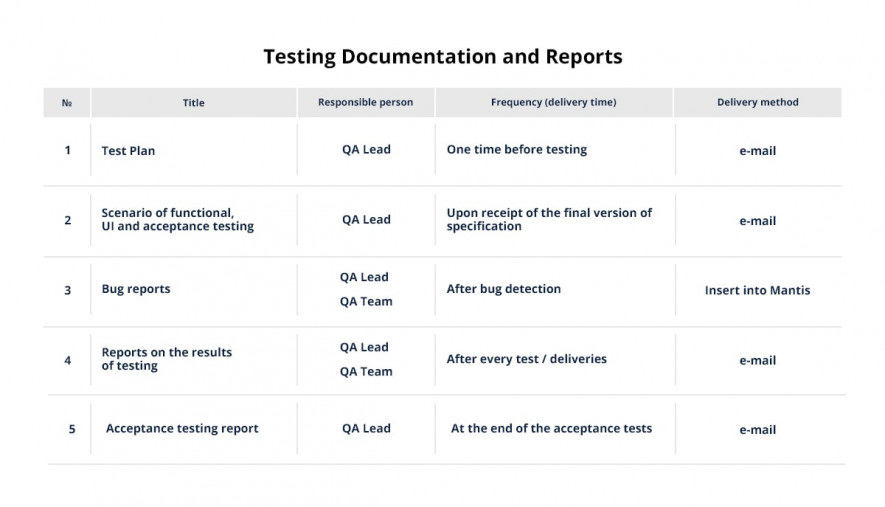 One more point that we advise you to verify is the strategy of testing. It holds a detailed description of the main testing phases and methods, types of testing that will be performed and criteria that will determine their completeness.
One more point that we advise you to verify is the strategy of testing. It holds a detailed description of the main testing phases and methods, types of testing that will be performed and criteria that will determine their completeness.
It is also important to agree on the acceptance plan which defines the criteria and possible risks of the acceptance testing. It is conducted to determine if all the testing requirements are met and accepted by the client.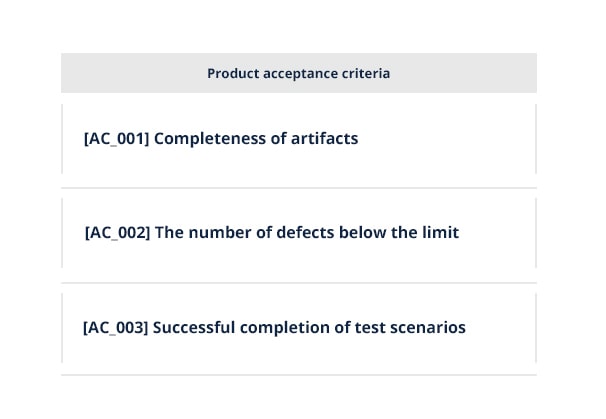
Test Plan Review: Summary
Test plan is not a document to cope with hands down. On the one side, it is difficult to create it and not to miss important information or carry it so that the client gets all the details. On the other side, you should have the experience to check a test plan to make sure it covers all the necessary details and that the testing provider gave the relevant information.
The above checklist will serve you a quick guide in the process of test plan verification. You will find the full copy of this test planning document on our website together with real case studies, researches and other information useful for project management.
Learn more from QATestLab
Related Posts:
- Main Parts of Successful Test Plan
- How Healthy Is Your Testing Process? A Full Checklist
- Check List: Find Out if It’s Time to Get Your Mobile App Tested
About Article Author
view more articles
has 3-year experience in blogging, technical writing, and copywriting.
View More Articles




